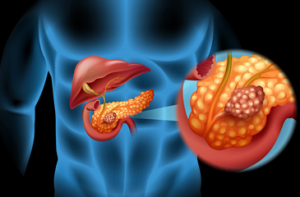Liver and Pancreatic Cancer
Liver and pancreatic cancers are among the most aggressive and challenging malignancies in the abdominal region. Often developing silently, these cancers may not present symptoms until advanced stages, making early detection and expert care critical. Despite their complexity, advancements in diagnostic tools and treatment strategies have significantly improved patient outcomes and quality of life.
At the Cancer Clinic, we offer comprehensive, multidisciplinary care for hepatobiliary and pancreatic cancers—integrating advanced imaging, targeted therapies, surgical expertise, and supportive care.

Parts of the Abdomen Affected by Cancer
1. Liver Cancer (Hepatocellular Carcinoma)
Primary liver cancer most often arises in individuals with underlying liver disease such as hepatitis B or C, cirrhosis, or fatty liver disease. Secondary (metastatic) liver cancer originates from other organs and spreads to the liver.
Symptoms:
- Pain or fullness in the upper right abdomen
- Unexplained weight loss
- Loss of appetite or early satiety
- Jaundice (yellowing of skin and eyes)
- Swelling in the abdomen
- Fatigue and general weakness
2. Intrahepatic Bile Duct Cancer (Cholangiocarcinoma)
A rare form of liver cancer arising from the bile ducts inside the liver. Risk factors include bile duct abnormalities, liver flukes, and chronic inflammation.
Symptoms:
- Jaundice
- Itchy skin
- Abdominal discomfort
- Pale stools and dark urine
- Fever or chills in case of infection
3. Pancreatic Cancer
One of the deadliest forms of cancer due to its late detection. Pancreatic adenocarcinoma is the most common type, often linked to smoking, diabetes, chronic pancreatitis, and genetic factors.
Symptoms:
- Pain in the upper abdomen or back
- Unexplained weight loss
- Jaundice
- Loss of appetite
- New-onset diabetes
- Digestive issues, including greasy stools
Diagnosis Methods
Our clinic uses a combination of cutting-edge imaging, laboratory testing, and biopsy techniques to ensure accurate diagnosis and staging of liver and pancreatic cancers:
- Ultrasound and CT Scans: First-line imaging tools to detect mass lesions
- MRI and MRCP: For detailed imaging of the liver, pancreas, and biliary tract
- PET-CT Scan: For staging and detecting spread
- Liver Function Tests & Tumor Markers: AFP (for liver cancer), CA 19-9 (for pancreatic cancer)
- Endoscopic Ultrasound (EUS) / ERCP: Enables biopsy of pancreatic lesions
- Image-Guided Biopsy: Confirmation of cancer type for treatment planning
Treatment and Outlook
- Surgical Oncology: Liver resection or liver transplant for localized tumors. Whipple procedure (pancreaticoduodenectomy) for operable pancreatic cancer. Pancreatic transplantation is also currently an option. Minimally invasive and robotic surgery approaches are gaining more momentum in surgery.
- Ablation and Embolization Therapies: Radiofrequency ablation (RFA) when primary surgery is not possible. Transarterial chemoembolization (TACE) or radioembolization.
- Chemotherapy and Targeted Therapy: Systemic or intra-arterial delivery to shrink tumors or manage advanced disease.
- Immunotherapy: (After comprehensive gene profile) Immune checkpoint inhibitors for select patients with advanced cancers.
- Palliative Care and Supportive Services: Pain management, nutritional support, and psychological counseling.
Early Diagnosis and Prevention
As these cancers often progress silently, early detection is vital for survival. Preventive Measures Include:For Liver Cancer:
- Non Alcoholic Fatty Liver Disease (NAFLD) is the current villain for liver cancer. WHO in 2025 has urged citizens to utilise dietary interventions and lifestyle changes to prevent fatty liver disease.
- Among the dietary interventions, the most important include soluble and insoluble fibers to maintain the gut milieu (gut microbes) and liver milieu.
- Research shows that incorporation of raw jackfruit-based diet is highly cost-effective and beneficial in the reversal of fatty liver (published data).
- Hepatitis B vaccination and antiviral treatment for chronic hepatitis.
- Recent studies suggest microplastics and obesity may contribute to pancreatic cancer risk through chronic inflammation, insulin resistance, and cellular toxicity.
- Avoiding alcohol overuse and managing obesity and diabetes.
- Regular screening for high-risk individuals (ultrasound and AFP tests).
For Pancreatic Cancer:
- Avoiding tobacco, alcohol, refined carbohydrates, and fatty foods.
- Microplastics and obesity are currently implicated in the causation of pancreatic cancer.
- Managing chronic pancreatitis and maintaining blood sugar levels.
- Genetic testing for high-risk families.
Take Charge of Your Lung and Chest Health
Experiencing digestive discomfort, unexplained weight loss, or jaundice? Don’t ignore these warning signs. Our specialized oncology team provides timely diagnosis, expert evaluation, and patient-focused treatment.
